Bharti Airtel
Positional Traders can use the below mentioned levels
Close above 411 Target 420/432
Intraday Traders can use the below mentioned levels
Buy above 409 Tgt 412, 416 and 421 SL 407
Sell below 403 Tgt 400,395 and 390 SL 405
Balrampur Chini
Positional Traders can use the below mentioned levels
Close above 177 Target 184/189
Intraday Traders can use the below mentioned levels
Buy above 177 Tgt 179, 181 and 184 SL 174
Sell below 173 Tgt 171.5,169 and 166 SL 174.5
Voltas

Positional Traders can use the below mentioned levels
Close above 565 Target 576/589
Intraday Traders can use the below mentioned levels
Buy above 565 Tgt 569, 572 and 577 SL 562
Sell below 560 Tgt 555,550 and 544 SL 563
How to trade Intraday and Positional Stocks Analysis — Click on this link
Performance sheet for Intraday and Positional is updated for August Month, Intraday Profit of 5.67 Lakh and Positional Profit of 5.64 Lakh. Please note we do not have any “ADVISORY Service”, I share this sheet to see how the system are performing and money can be made in Stock Market if System are followed with discipline. Also the performance differs from trader to trader.
http://tradingsystemperformance.blogspot.in/
http://stockpositionaltrading.blogspot.in/
- All prices relate to the NSE Spot/Cash Market
- Calls are based on the previous trading day’s price activity.
- Intraday call is valid for the next trading session only unless otherwise mentioned.
- Stop-loss levels are given so that there is a level below/above, which the market will tell us that the call has gone wrong. Stop-loss is an essential risk control mechanism; it should always be there.
- Book, at least, part profits when the prices reach their targets; if you continue to hold on to positions then use trailing stops to lock in your profits.
Follow on Facebook during Market Hours: https://www.facebook.com/pages/Bramesh
Follow on Twitter during Market Hours: https://twitter.com/brahmesh



Yesterday, Voltas made a life time high of 565 and what made u to categorise this recommendation under DEMAND AND SUPPLY.